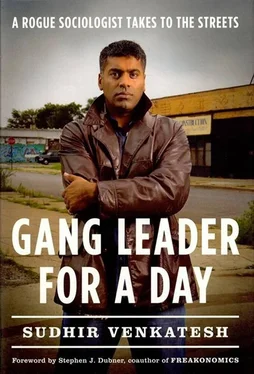Politicians, academics, and law-enforcement officials all offered policy solutions, to little avail. The liberal-minded deployed their traditional strategies-getting young people back into school and finding them entry-level jobs-but few gang members were willing to trade in their status and the prospect of big money for menial work. Conservatives attacked the crack epidemic by supporting mass arrests and hefty prison sentences. This certainly took some dealers off the streets, but there was always a surplus of willing and eager replacements.
The national mood had grown increasingly desperate-and punitive. Prosecutors won the right to treat gangs as organized criminal groups, which produced longer prison sentences. Judges gave the police permission to conduct warrantless searches and to round up suspected gang members who were hanging out in public spaces. In schools, mayors ruled out the wearing of bandannas and other clothing that might signal gang affiliation. With each day’s newspaper bringing a fresh story about gang violence, these efforts met little political resistance, even if they weren’t all that effective.
From J.T.’s perspective the real crisis was that all these measures conspired to make it harder to earn as much money as he would have liked.
Because crack was sold on street corners, with profits dependent on high volume and quick turnover, J.T. had to monitor a round-the-clockeconomic operation. He loved the challenge of running a business and making money. From all indications his transition to the Robert Taylor Homes was an unqualified success. This had won the attention of his superiors, a group of several dozen people in prison and on the streets known collectively as the Black Kings’ board of directors. They had begun inviting J.T. to high-level meetings to discuss the big picture of their enterprise. Pleased with his managerial prowess and attention to detail, they rewarded J.T. with extra responsibilities. He had just been asked, for instance, to help the gang with its foray into Chicago politics.
“Even the gang needs friends with connections,” J.T. told me. “And we’re getting more successful, so we need more friends.”
“I don’t see why a gang wants to deal with politicians,” I said. “I don’t see what they get out of it. It seems they’d have a greater chance of getting caught if they started hanging out with politicos, no?”
He reminded me that his Black Kings gang was just one of about two hundred BK gangs around the city that were making money selling crack. With that much money, the citywide BK leadership needed to think about investing and laundering.
“Let’s say, Sudhir, that you’re making only a hundred bucks,” he explained. “You probably don’t have a lot of real headaches. You don’t need to worry about niggers stealing it from you. You don’t need to worry that when you go into a store, they’ll ask you where you got the money. But let’s say you got a thousand bucks. Well, you can’t really carry it around, and you’re a street nigger so you don’t have a bank account. You need to keep it somewhere. So you start to have things to think about.
“Now let’s say it’s ten thousand. Okay, now you got niggers who are watching you buy a few things: a new TV, a new car. They say, ‘Oh, Sudhir, he’s got a new necklace. And he’s a student. He don’t work? So where’d he get the money? Maybe he has cash in his house.’ So now you have more things to worry about.
“Now let’s say it’s a hundred thousand. You want to buy a car, but the car dealer has to report to the government when people pay for a car with thirty thousand dollars in cash. So what are you going to do? You may have to pay him a thousand bucks to keep his mouth shut. Then maybe you need to hire security, ’cause there’s always some nigger that’s going to take the chance and rob you. That’s another few thousand, and you got to trust the security you hired, ’cause they know where you keep the money.
“Now let’s say you got five hundred thousand or a million. Or more. That’s what these niggers above me are worrying about. They need to find ways to clean the money. Maybe they hide it in a friend’s business. Maybe they tell their sisters to open up bank accounts. Or they get their church to take a donation. They have to constantly be thinking about the money: keeping it safe, investing it, protecting themselves from other niggers.”
“But I still don’t understand why you need to deal with politicians.”
“Well, see, an alderman can take the heat off of us,” J.T. said with a smile. “An alderman can keep the police away. He can make sure residents don’t get too pissed off at us. Let’s say we need to meet in the park. The alderman makes sure the cops don’t come. And the only thing they want from us is a donation-ten thousand dollars gets you an alderman for a year. Like I keep telling you, our organization is about helping our community, so we’re trying to get involved in what’s happening.”
J.T.’s monologue surprised me on two fronts. Although I’d heard about corrupt aldermen in the old days-denying building permits to political enemies, for instance, or protecting a gang’s gambling racket-I had a hard time believing that J.T. could buy off a politician as easily as he described. Even more surprising was J.T.’s claim about “helping our community.” Was this a joke, I wondered, or did he really believe that selling drugs and bribing politicians would somehow help a down-and-out neighborhood pick itself up?
Besides the Black Kings’ relationships with various aldermen, J.T. told me, the gang also worked with several community-based organizations, or CBOs. These groups, many of them created with federal funding during the 1960s, worked to bring jobs and housing to the neighborhood, tried to keep kids off the street with recreation programs, and, in places like the South Side, even enacted truces between warring gangs.
Toward the end of the 1980s, several CBOs tried instilling civic consciousness in the gangs themselves. They hired outreach workers (most of whom were former gangsters) to persuade young gang members to reject the thug life and choose a more productive path. These reformers held life-skills workshops that addressed such issues as “how to act when you go downtown” or “what to do when a lady yells at you for drinking beer in the park.” They also preached the gospel of voting, arguing that a vote represented the first step toward reentry into the social mainstream. J.T. and some other gang leaders not only required their young members to attend these workshops but also made them participate in voter-registration drives. Their motives were by no means purely altruistic or educational: they knew that if their rank-and-file members had good relationships with local residents, the locals were less likely to call the police and disrupt the drug trade.
J.T.’s ambitions ran even higher. What he wanted, he told me, was to return the gang to its glory days of the 1960s, when South Side gangs worked together with residents to agitate for improvements in their neighborhoods. But he seemed to conveniently ignore a big difference: Gangs back then didn’t traffic in drugs, extort money from businesses, and terrorize the neighborhood with violence. They were not innocent kids, to be sure. But their worst transgressions tended to be street fighting or intimidating passersby. Because J.T.’s gang was involved in drugs and extortion (and more), I was skeptical that he could enjoy much more support from the local residents than he currently had.
One cold November night, J.T. invited me to a meeting at a small storefront Baptist church. An ex-gangster named Lenny Duster would be teaching young people about the rights, responsibilities, and power of voting. The next election, while a full year away, would place in office a great many state legislators as well as city aldermen.
Читать дальше












